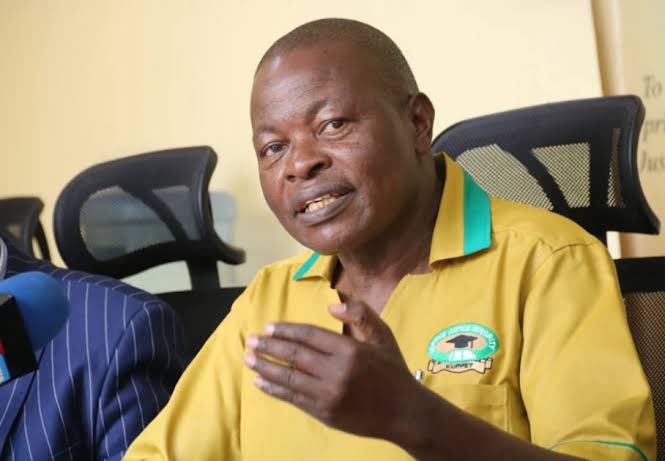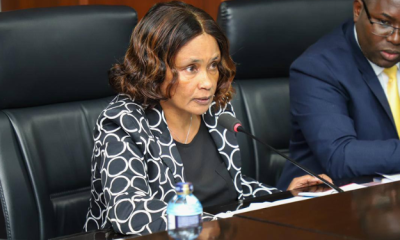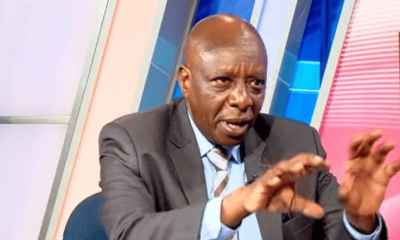News
Lowest Paid Teachers Get 29.6pc Pay Hike In New Sh33 Billion Unions Deal With TSC
The tiered increase structure deliberately favors classroom teachers, with the lowest-paid educator currently earning around Sh23,000 monthly set to see their pay rise to approximately Sh29,000 while highest teacher to earn Sh167,415.

Historic agreement ends months of negotiations as classroom teachers emerge biggest winners
Kenya’s lowest-paid teachers are set to receive a significant boost to their salaries after two major unions signed a landmark Sh33 billion collective bargaining agreement with the Teachers Service Commission (TSC) on Friday.
The Kenya Union of Post Primary Education Teachers (Kuppet) and the Kenya Union of Special Needs Education Teachers (Kusnet) concluded day-long negotiations at the Kenya Institute of Special Education in Kasarani, securing salary increments ranging from 5 percent for the highest-paid teachers to 29.6 percent for those at the bottom of the pay scale.
The tiered increase structure deliberately favors classroom teachers, with the lowest-paid educator currently earning around Sh23,000 monthly set to see their pay rise to approximately Sh29,000 while highest teacher to earn Sh167,415. This represents a fundamental shift from previous agreements that primarily benefited senior administrators and principals.
“We have managed to get an increment of 5 percent to 29.6 percent,” announced Akelo Misori, Secretary General of Kuppet, after the signing ceremony. “This award in basic pay has favoured, to a large extent, the ordinary teacher, the one who bears the brunt of the work in schools.”
Misori emphasized that the new structure corrects historical imbalances, noting that the 2016-2021 CBA disproportionately benefited school administrators while leaving classroom teachers behind. The current agreement shifts focus back to what he termed “the base of the teaching pyramid.”
The financial implications are substantial. The agreement projects an annual salary adjustment budget of Sh8.4 billion yearly, totaling Sh33 billion over the five-year cycle ending June 30, 2029. Implementation begins immediately, with teachers expected to see revised paychecks by the end of July 2025.
Beyond salary adjustments, the unions achieved a significant victory in securing the elimination of the controversial Career Progression Guidelines (CPG). The system, introduced in 2018, has faced fierce opposition from teachers over its rigidity and what many considered punitive nature.
“We have removed career progression, and it will cease to exist from 30 June 2026,” Misori confirmed. “It has been under review and caused unnecessary interdictions. Its removal is a major relief to many.”
However, the agreement maintains the status quo on allowances, with union leaders acknowledging that the current national budget did not accommodate expanded allowances for teachers. Misori hinted at renewed discussions next year to revisit commuter, hardship, and housing allowances, which have remained static despite inflation and growing regional disparities.
The negotiations followed different timelines for the two unions. Kusnet leaders concluded their talks in just two hours, from 11 AM to 1 PM, while Kuppet’s negotiations extended throughout the afternoon until 8 PM. Kusnet Secretary General James Torome declined to comment after the signing, walking away silently from media questions.
The successful conclusion of these negotiations comes after TSC met with the Salaries and Remuneration Commission earlier in the week to develop a counter-offer to teachers’ demands. The talks were convened amid mounting pressure from union leaders who had criticized the stalled implementation of the 2021-2025 Collective Bargaining Agreement after it expired last month.
Notably, the Kenya National Union of Teachers (KNUT) officials were still engaged in negotiations at the time of the other unions’ agreement, suggesting that comprehensive sector-wide resolution may still be pending.
The new CBA covers the period from July 1, 2025, to June 30, 2029, marking a significant milestone in Kenya’s education sector labor relations. For thousands of teachers across the country, particularly those in lower job groups, the agreement represents long-awaited recognition of their contributions to the nation’s education system.
The deal’s emphasis on supporting the lowest-paid teachers reflects a broader policy shift toward addressing income inequality within the teaching profession, potentially improving morale and retention rates among classroom educators who form the backbone of Kenya’s education system.
Kenya Insights allows guest blogging, if you want to be published on Kenya’s most authoritative and accurate blog, have an expose, news TIPS, story angles, human interest stories, drop us an email on [email protected] or via Telegram
-

 Business2 days ago
Business2 days agoKakuzi Investors Face Massive Loss as Land Commission Drops Bombshell Order to Surrender Quarter of Productive Estate
-

 Politics2 weeks ago
Politics2 weeks agoODM Shuts Door on Gachagua Alliance, Signals Long-Term Deal with Ruto Ahead of 2027
-

 News2 weeks ago
News2 weeks agoBusinessman Adan Haji Isaack on Spot for Allegedly Harassing City Professor Over Disputed Land
-

 News2 weeks ago
News2 weeks agoKenyan Activists Bob Njagi and Nicholas Oyoo Released After 38 Days in Ugandan Custody
-

 Investigations2 weeks ago
Investigations2 weeks agoPeter Agoro Legal Battles Reveal How EACC Framed a Whistleblower to Protect Corrupt Elites
-

 Investigations2 weeks ago
Investigations2 weeks agoEXCLUSIVE: The $1.7 Billion Oil Heist That’s Starving South Sudan While Elites Feast on Blood Money
-

 Investigations3 days ago
Investigations3 days agoINSIDER LEAK REVEALS ROT AT KWS TOP EXECUTIVES
-

 Politics1 week ago
Politics1 week agoRuto Set to Dominate ODM@20 in Mombasa, Positioning Himself as Raila Odinga’s Political Heir Ahead of 2027































